Key takeaways:
- Understanding the specific needs for the event space, including size, layout, mood, and accessibility, is essential for guest comfort and satisfaction.
- Exploring unique venue options can enhance the event’s atmosphere; consider things like rooftop gardens, historical buildings, and art studios to leave a lasting impression.
- Evaluating location and accessibility, including parking options and public transport, significantly impacts attendance and overall guest experience.
- Budgeting for hidden costs and planning for off-peak bookings can maximize financial resources while securing unique venues.
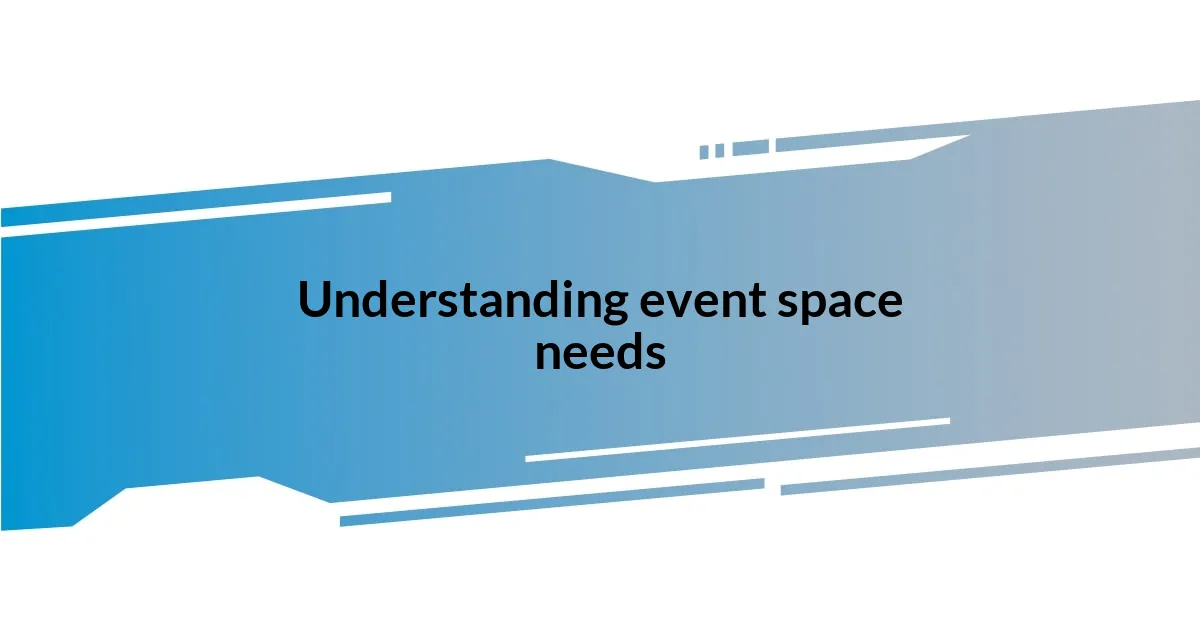
Understanding event space needs
Understanding the specific needs of an event space is crucial before diving into options. I remember when I was planning a milestone birthday party; I had this vision of a lively atmosphere, but it suddenly hit me—what if the space felt too cramped? Determining the right size and layout can make a huge difference in how comfortable and enjoyable the event feels.
I often reflected on how different types of gatherings require unique elements. For instance, a corporate seminar demands more functional seating arrangements compared to a wedding, which calls for a romantic ambiance. Asking myself questions like, “What mood do I want to create?” helped me clarify the essential features I needed in the venue.
Accessibility is another important consideration. When I was searching for a space for a community fundraiser, I found it challenging to locate a venue that was both welcoming and convenient for everyone. I realized that parking availability and public transport access played a larger role in attendance than I initially thought. How many potential guests could miss out simply due to location? This insight really shaped my approach to finding the perfect spot.
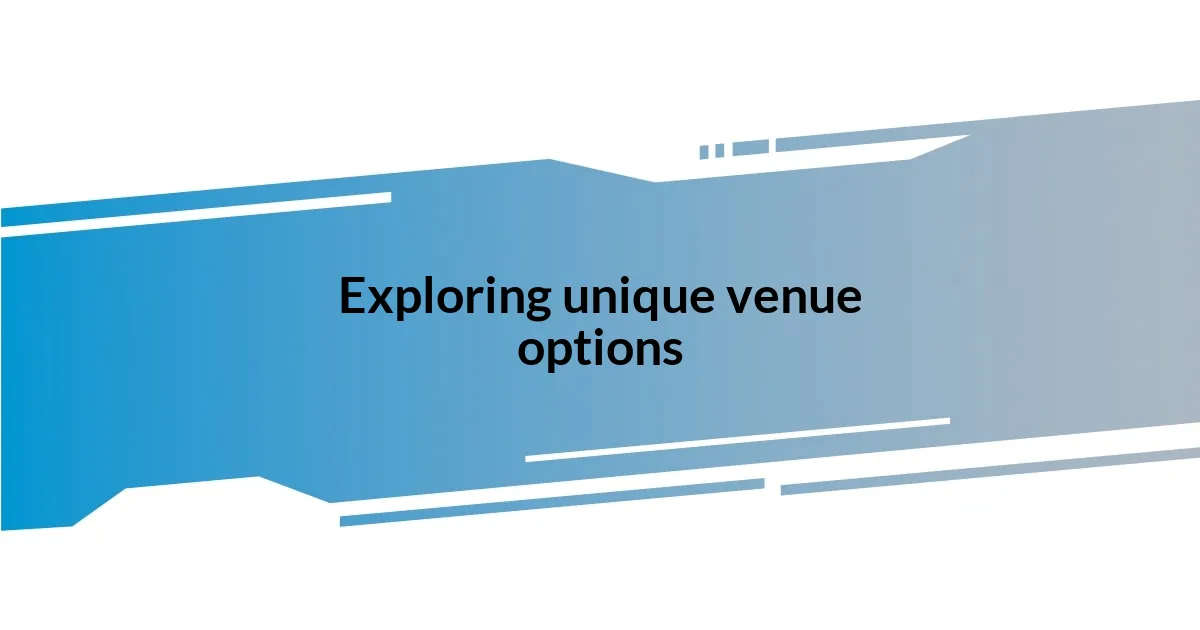
Exploring unique venue options
When I finally set out to explore unique venue options, I felt a sense of excitement wrapped in a bit of anxiety. I knew I wanted something that would leave a lasting impression on my guests, but finding those truly distinctive spaces proved to be a treasure hunt. I remember stumbling upon an old warehouse that had been transformed into a chic art gallery; it was like walking into an artist’s dream. The exposed bricks and vibrant murals set the perfect backdrop for my event. I learned that sometimes the most unexpected places can spark the most creativity.
Here are some unique venue options worth considering:
– Rooftop Gardens: Offering breath-taking views and a serene atmosphere.
– Historical Buildings: Embedding a sense of charm and nostalgia, perfect for formal events.
– Art Studios: With colorful installations, they can inspire creativity in attendees.
– Converted Barns: Ideal for rustic themes and a cozy, intimate vibe.
– Spaceship-themed venues: For the bold, these can add a fun, quirky twist to any event.
Each of these options brought me closer to achieving that magical ambiance I envisioned. It made me realize that seeking out a venue can also reflect the essence of the gathering itself.
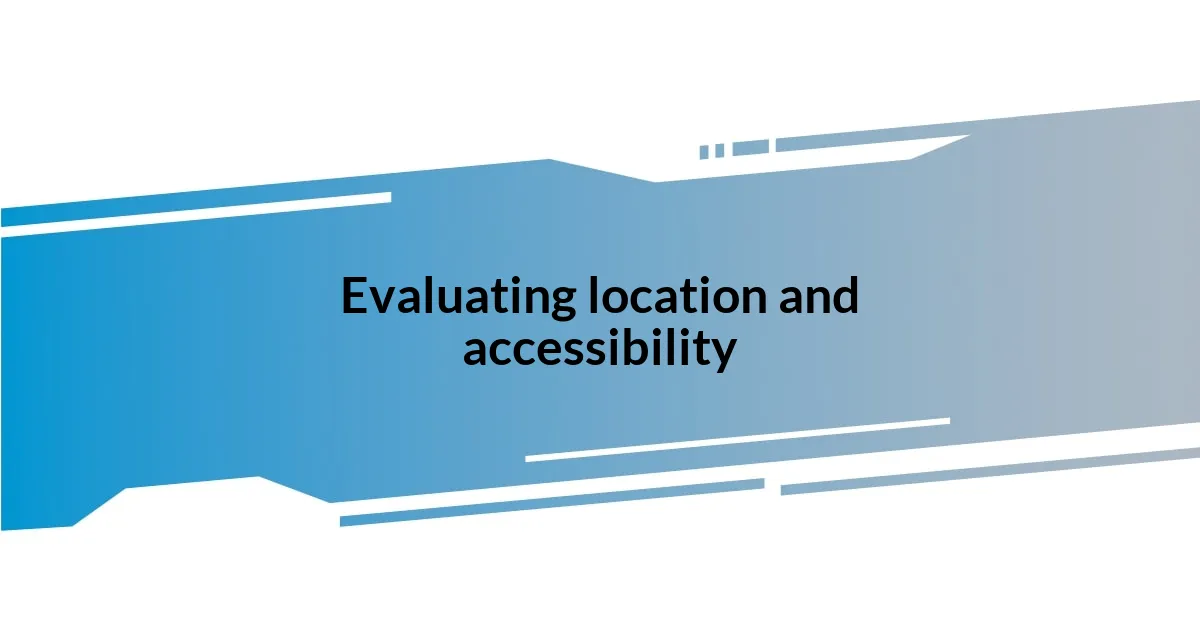
Evaluating location and accessibility
When it comes to evaluating location and accessibility, I’ve learned that it is not just about finding a beautiful space but about how easy it is for your guests to get there. I remember one time organizing a casual gathering for friends in a charming little café, only to find out that there was limited parking. Many of my friends ended up being late, which put a damper on the evening. This taught me that a venue’s location plays a pivotal role in overall guest satisfaction.
Accessibility goes beyond just parking, though. I’ve noticed that venues close to public transport can make a significant difference. During another event I coordinated, we chose a location within walking distance of a subway station. The ease of getting there not only encouraged more people to attend but also allowed guests to enjoy themselves without the worry of driving home later. In my experience, having reliable transport options nearby can improve attendance and set a positive tone for the event.
Lastly, I find that the surrounding neighborhood can impact how much guests enjoy their time before and after the event. When I hosted a networking event in a vibrant district filled with shops and eateries, attendees took advantage of exploring the area. It made for an unforgettable experience, transforming the event from just a meeting into a memorable outing. Paying attention to these details can really elevate the overall experience for everyone involved.
| Factor | Importance |
|---|---|
| Parking Availability | Crucial for guest convenience; limited parking can deter attendance. |
| Public Transport Access | Increases accessibility; helps in driving attendance. |
| Neighborhood Vibe | A lively area can enhance the experience before and after the event. |
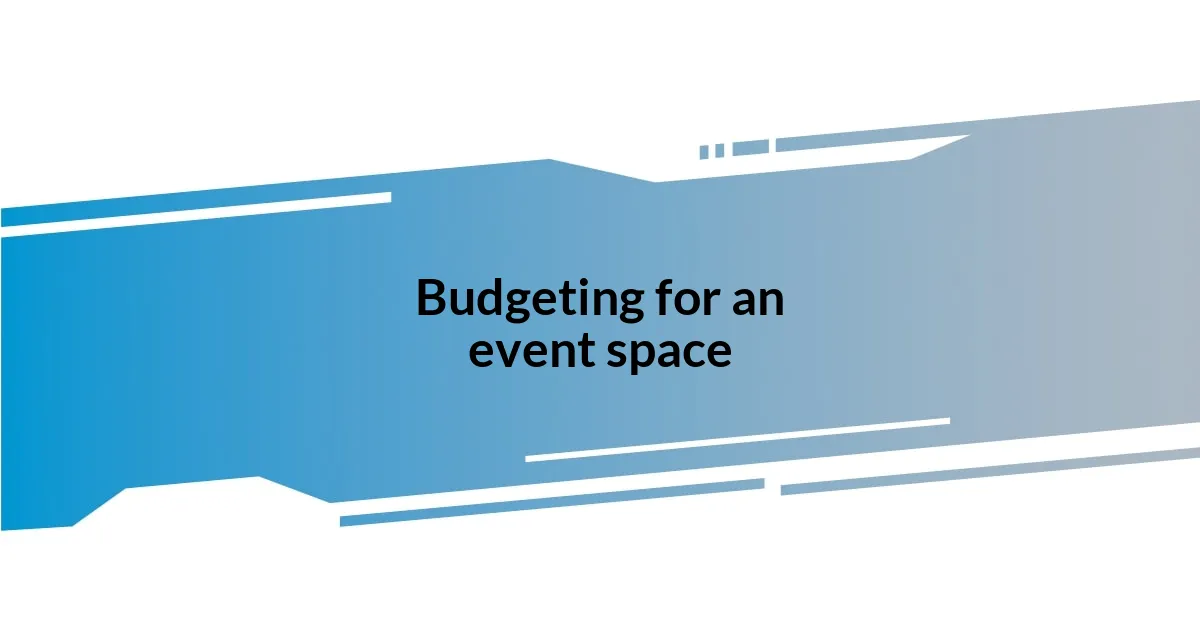
Budgeting for an event space
When budgeting for an event space, I discovered quickly that costs can vary dramatically based on location, size, and amenities. One time, I overlooked the hidden fees associated with a seemingly affordable venue. Licenses, insurance, and cleaning costs can add up fast. Have you ever found yourself facing unexpected expenses? It’s a wake-up call that I wish I had anticipated earlier.
To make the most of my budget, I created a detailed spreadsheet mapping out projected costs against my financial limits. This approach gave me a clearer picture of where I could splurge a little and where I needed to tighten the belt. Juggling priorities can be tricky—do you choose a prime location or a unique venue that gets everyone talking? In my experience, sticking to your budget while allowing for a few splurges can lead to finding that perfect balance.
I also learned the importance of timing in the budgeting process. Booking a venue during off-peak seasons often can save substantial amounts. I remember securing an incredible art studio for my event in January instead of the summer, and the savings were significant. This timing trick not only eased my budget pressures but also gave me the chance to secure popular venues that might have been booked solid during peak times. Ultimately, it’s about blending creativity with strategic financial planning to create an unforgettable experience.
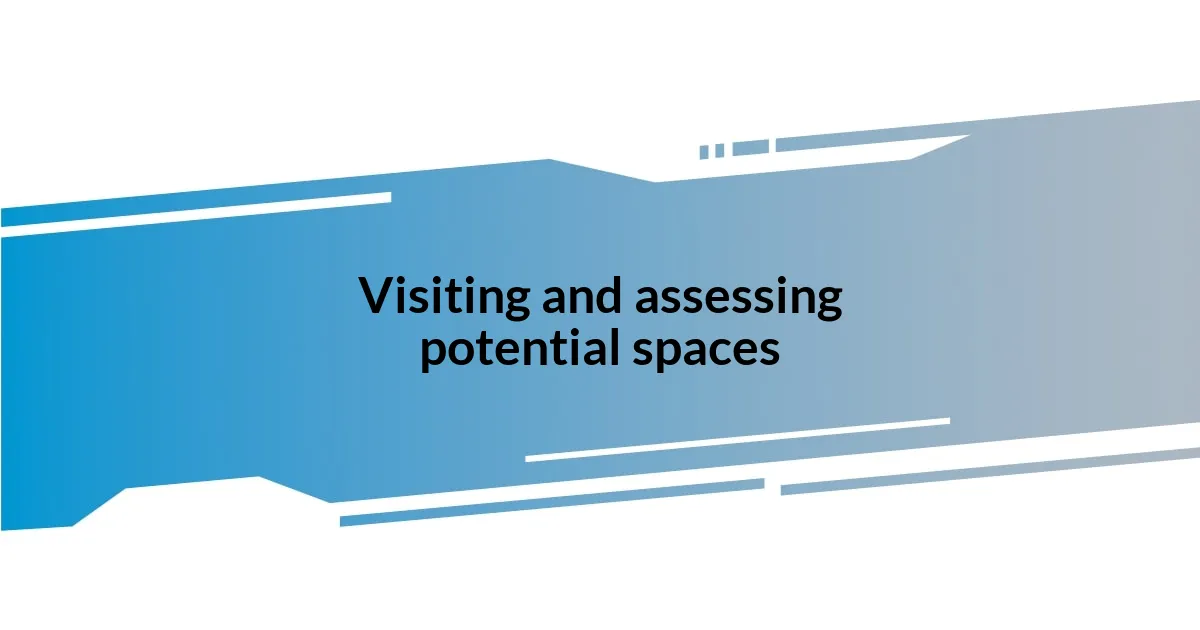
Visiting and assessing potential spaces
Visiting potential spaces is an exhilarating yet sometimes overwhelming part of the event planning process. I vividly recall stepping into a beautifully designed loft for the first time, the natural light flooding in made the atmosphere feel warm and inviting. Yet, as I looked around, a nagging thought crept in: would it be suitable for my guest list? I learned that while aesthetics are crucial, it’s essential to assess whether the layout fits the flow of the event I envisioned.
During my tours, I often felt a range of emotions. One moment, I’d be captivated by a venue’s charm, and the next, I’d get a sinking feeling realizing it couldn’t accommodate my needs. For example, I once found myself in a rustic barn that had great character but lacked modern amenities like air conditioning. Imagine hosting an event in sweltering heat—no thanks! I had to weigh the venue’s uniqueness against practicality, which can be a tough balance to strike.
I also learned the value of engaging with venue staff during my visits. They often provide insights that aren’t featured in brochures or websites. On one occasion, the manager shared past event experiences, mentioning how the space transformed when decorated for a gala. That conversation sparked ideas I hadn’t considered before! Engaging in dialogue not only fosters a positive relationship, but it also helps to uncover the venue’s potential for your specific vision. Have you ever thought about how a friendly chat can unveil hidden gems? I certainly have, and it has made all the difference in my planning journey.
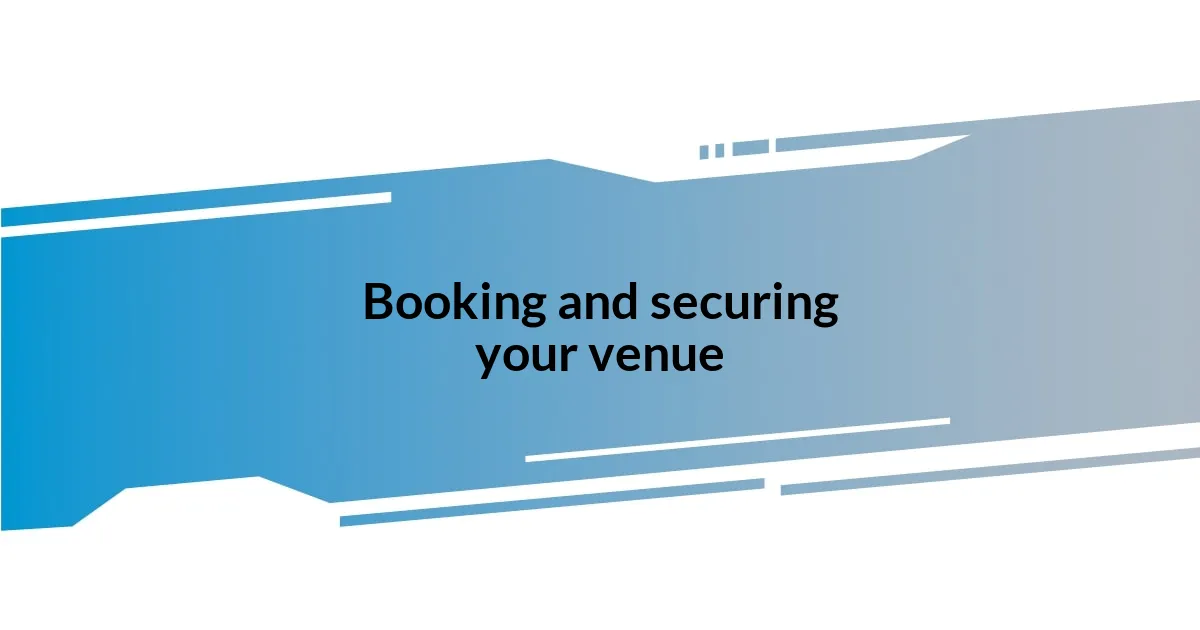
Booking and securing your venue
Securing a venue is more than just signing a contract; it’s about ensuring the space aligns with your vision. I remember the moment I finally decided on a quirky warehouse after weeks of indecision. The excitement was palpable, but I almost missed the fine print in the rental agreement. Did you know there could be conflicting clauses about capacity and cancellation dates? Steering clear of these pitfalls needs close attention; otherwise, things can take an unexpected turn.
As I finalized the booking, I felt a sense of relief wash over me, but I also learned the importance of prompt communication. This was especially true when I had to clarify details about layout and setup times. I found that regularly checking in with venue coordinators kept everything on track and minimized misunderstandings. Have you ever felt the weight of uncertainty lingering until you could connect with someone directly? That’s where a friendly dialogue can work wonders, making the planning process smoother and more enjoyable.
Also, securing your venue doesn’t stop at signing the contract. I learned that following up after my initial booking was crucial to ensuring my specific date and time were locked in. After submitting my deposit, I made a habit of confirming details regularly. This proactive approach helped prevent any last-minute hiccups. Trust me, a little diligence goes a long way—being organized can transform what could be a stressful situation into a seamlessly executed event.